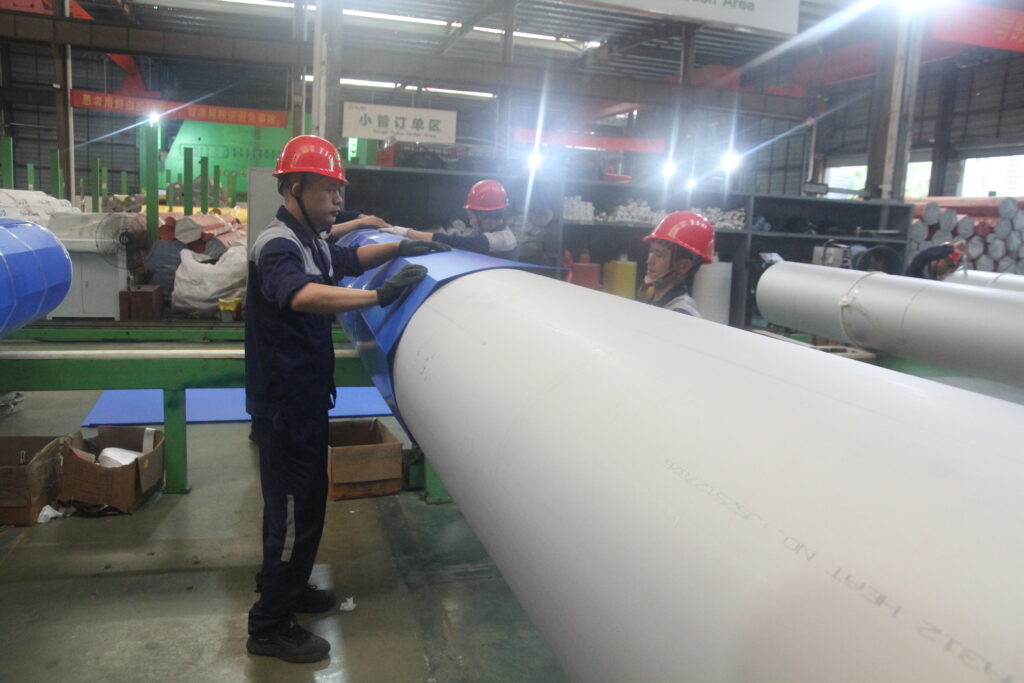The Impact of Stainless Steel Pipe Material on Natural Gas Pipeline Performance
The choice of stainless steel pipe material is one of the most critical factors affecting the performance and safety of natural gas pipeline. Material properties, defined by alloy composition and microstructure, directly influence corrosion resistance, mechanical stability, stainless steel pipe welding reliability, and adaptability to diverse service environments. Below, we explore how material characteristics shape pipeline performance and why careful material selection is essential.

Schedule 40 stainless steel pipes manufactured by Ganyeah Group
1. Alloying Elements and Corrosion Resistance
Natural gas often contains corrosive components such as H₂S, CO₂, and moisture. The ability of stainless steel pipes to resist these environments depends heavily on alloying elements:
- Chromium (Cr): The foundation of corrosion resistance. When Cr ≥ 10.5%, a protective Cr₂O₃ passive film forms. Grades with Cr below 16% (e.g., 409) are prone to wall penetration corrosion in wet or sulfur-rich environments.
- Nickel (Ni): Provides structural stability and toughness. 304 stainless steel (8–10.5% Ni) maintains excellent ductility and weldability, while higher Ni grades like 316 (10–14% Ni) perform better in humid and sulfur-containing natural gas conditions.
- Molybdenum (Mo): The key to preventing pitting and crevice corrosion. 304, without Mo, is unsuitable for H₂S-rich gas, whereas 316 (2–3% Mo) withstands moderate levels, and duplex grades like 2205 (≈3% Mo) excel in extreme sour gas environments.
- Carbon (C), Titanium (Ti), Niobium (Nb): Low-carbon grades (304L, 316L, C ≤ 0.03%) and stabilized steels (321, with Ti) minimize intergranular corrosion in welded pipelines.
2. Microstructure and Mechanical Properties
The microstructure—whether austenitic, ferritic, or duplex—directly impacts strength, toughness, and pressure resistance:
- Austenitic Stainless Steels (304, 316): High ductility (elongation ≥ 30%) and excellent toughness, suitable for high-pressure (≥10 MPa) and cryogenic LNG transport (-162°C).
- Ferritic Stainless Steels (409, 430): Economical but limited to low-pressure, dry gas environments. Poor toughness below -20°C restricts their use in demanding applications.
- Duplex Stainless Steels (2205, 2507): High strength (tensile ≥ 690 MPa) and superior stress corrosion cracking resistance. Ideal for deep-sea or high-H₂S gas pipelines, though less suitable for extreme cryogenic service.
3. Stainless Steel Pipe Welding Considerations
Since natural gas pipeline rely heavily on welded joints, welding performance is crucial:
- Austenitic Stainless Steels (304, 316): Good weldability but prone to sensitization. Low-carbon variants (304L, 316L) are preferred to ensure reliable welds.
- Ferritic Stainless Steels (430): Limited weldability due to grain coarsening and brittleness. Suitable only for simple, thin-wall, low-pressure piping.
- Duplex Stainless Steels (2205): Strong weldability when cooling rates are controlled. Post-weld heat treatment is often required to restore the optimal phase balance.
4. Material Suitability for Service Environments
Different pipeline conditions require tailored stainless steel pipe materials:
- High-Pressure Transport (≥10 MPa): Duplex steels (2205) or thick-walled 316L ensure mechanical stability.
- Sour Gas (H₂S > 50 ppm): Mo-containing 316L or duplex 2205 resists stress corrosion cracking.
- Cryogenic LNG (-162°C): Austenitic steels (304L, 316L) are the only reliable choice due to their toughness at ultra-low temperatures.
- Buried or Humid Environments: 316L with external coatings (e.g., 3PE) or duplex steels provide superior durability.
Why Partner with Ganyeah Group?
At Ganyeah Group, we understand that “material determines service life.” Our technical experts help customers select the right stainless steel pipe material for natural gas pipeline, balancing performance, safety, and cost efficiency.
We provide:
- Material consulting for different pipeline environments.
- Certified stainless steel pipe welding services ensuring leak-free joints.
- System integrity testing (helium leak detection, corrosion testing).
- Customized solutions meeting ASME, ASTM, and ISO standards.
With decades of expertise, Ganyeah Group delivers pipeline solutions trusted by energy, LNG, and petrochemical industries worldwide.
📩 Contact our team today to discuss your project needs and secure reliable stainless steel pipe solutions tailored to your pipeline requirements.
Related Articles:
How Stainless Steel Pipe Material Selection Impacts the Cost of Natural Gas Pipelines
How to Select the Right Stainless Steel Pipe Material for Natural Gas Pipelines
Requirements and Standards for Stainless Steel Pipes in Natural Gas Pipelines
Stainless Steel Pipe Welding Requirements for Natural Gas Pipelines
